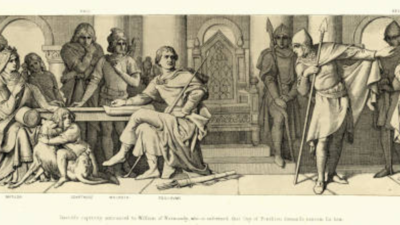Did you just study French for your English exam? Here’s the history your textbook missed

Almost 950 years ago, a conquest led by William, Duke of Normandy, invaded not only England but also the language of the “English”. In the Battle of Hastings, Anglo-Saxon King Harold was defeated, and his loss left a profound and lasting impact on how the language evolved over the centuries that followed. In the words of French linguist Bernard Cerquiglini, “The English language does not exist.” That’s mispronounced French.Today, students across classrooms around the world learn English as a vital part of their academic journey. Yet, what many fail to recognise is that nearly 40% of the English words they study are actually of French origin. It is well known that languages borrow from one another, but when the influence becomes as deep and enduring as that of French on English, it is more than borrowing, it is a language invasion.Modern linguistic estimates show that 30–40% of English vocabulary comes from French, much of it tracing directly to the centuries of Norman rule. From classrooms to courts, and from idioms to essay writing, students regularly use words rooted in Norman French, often without even knowing it.
A conquest for culture, language and the English throne
Prior to 1066, the dominant language of England was Old English, a Germanic tongue spoken by the Anglo-Saxons. It was used for writing, law codes, poetry, and public discourse. But the Norman Conquest brought about a complete linguistic and social restructuring.After claiming the crown at Hastings, William the Conqueror graced the English throne on Christmas Day of 1066. He got rid of the English nobility and appointed French-speaking Norman aristocrats in their place, who then introduced their own language, a dialect of Old French known as Anglo-Norman, as the new standard of power, law, and prestige. Over the next 300 years, French became the language of the court, the church, the elite and the law. Old English, in contrast, became the language of the common people; rural, unwritten, and declining. With nearly 85% of Old English vocabulary lost during this period, a new hybrid language emerged, fusing French and English. This hybrid evolved into Middle English, the basis of the language students learn today.
French words dominate English vocabulary
The Norman Conquest triggered the flooding of French vocabulary across all aspects of English life. According to Morocco World News, an estimated 30% of modern English vocabulary comes directly from French, and English speakers unknowingly use a vast French-origin vocabulary.Key vocabulary areas shaped by French include:
The language battleground has French footprints all over
The Norman Conquest didn’t just add new vocabulary, it also changed how English words are formed. French contributed widely used prefixes and suffixes such as:
- Prefixes: con-, de-, ex-, pre-, trans-
- Suffixes: -ment, -ance, -ity, -tion, -ism, -ize
These are now fundamental to word formation in English. For example:
- hindrance = Old English hinder + French -ance
- coverage = French cover + -age
- reborn = French prefix re- + native English word
Even English syntax was affected. French-style phrases such as attorney general and court martial follow the noun-adjective structure common in French, unlike standard English order.
English as a museum for french words
English learners in India and around the world often encounter French-rooted vocabulary in textbooks, exams, and academic writing. Terms like critique, debate, motivation, inspiration, and education all trace back to French. Even subject names like history, grammar, and literature are French imports. Understanding the roots provide a much intriguing lesson and realisation that when learning one language you might actually be mastering traces of many.
The cultural residue in sounds and idioms
French also left a phonetic signature on English. Words like ballet, filet, corps, and bouquet retain silent letters and French pronunciations. Additionally, French idioms such as:
- bon voyage
- joie de vivre
- vis à vis
- au contraire
- à la mode
are still used in both spoken and academic English today.
Elite dominated it before commoners embraced it
The English populace did not blatantly accept the French parade over their language instantly. In fact, in the early years the French adoption was restricted to the elite, while commoners spoke English. It was by the 13th century that French words found their way into everyday communication. With time, the English language evolved into a stew of both, incorporating French structure and vocabulary into the heart of the English language.This legacy is why, today, English is not purely Germanic, despite its origins, it is a hybrid tongue, carrying with it the linguistic DNA of conquest, colonisation, and cultural fusion.English is now spoken by billions, and the Norman Conquest remains one of its most formative chapters. For Indian students preparing for board exams, entrance tests, or mastering fluency, understanding this linguistic history offers more than trivia, it helps decode the very structure of the English they learn every day.







